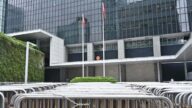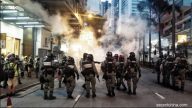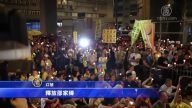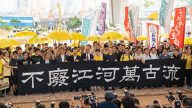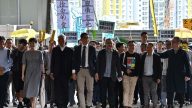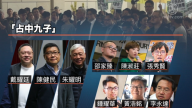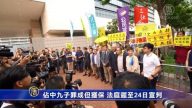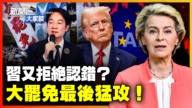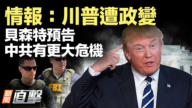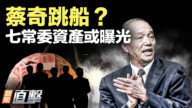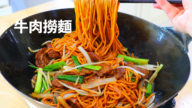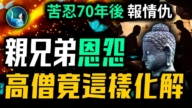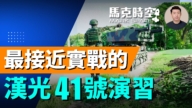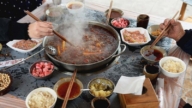【新唐人2014年06月13日讯】中共日前针对香港发表的《白皮书》,激起各界港人的强烈反弹,香港各大报章以及各界人士纷纷针对《白皮书》所提出的“中央拥有对香港的全面管治权”和“‘爱国’是治港者的基本政治要求”等部分做出批评,香港舆论认为,中共最初承诺的“一国两制”已死,《白皮书》是中共对香港管治权的“摊牌”,要让香港民主普选落空。
中共国务院6月10号发表的《白皮书》——《“一国两制”在香港特别行政区的实践》表明,“香港的高度自治权不是完全自治,也不是分权,是中央授予的地方事务管理权。”《白皮书》中,还把香港法官及司法人员视为“治港者”,要求他们必须爱国。
这份《白皮书》引发香港各界的强烈反弹,11号,多个团体到香港“中联办”焚烧《白皮书》,抗议《白皮书》矮化香港的自治地位,破坏港人治港的承诺,香港民众表示,港人不会因为威吓而放弃争取公民提名,他们呼吁香港市民参与6月22号的公投,及“七一民主大游行”。
香港“公民党”则要求中共收回《白皮书》﹔同时,香港“大律师公会”发表四页声明,批评《白皮书》不应将法官和司法人员视为“治港者”,令人以为香港法院是政府机构的一部分,与政府互相配合。
“香港城市大学”政治学教授郑宇硕指出,《白皮书》带出的讯息是“一国”压倒“两制”,目前香港的高度自治受到了威胁,等于宣布“香港高度自治已死”。
香港城市大学政治学教授郑宇硕:“当初在中、英谈判的时候,中央领导人一直强调,允许香港拥有高度的自治,现在都不再谈这个高度的自治了,现在非常强调什么都是一国才是根本,什么都是中国的主权,中国的国家利益是最重要的考虑啦。”
美国媒体《大纪元时报》指出,中共发布的《白皮书》是变相重弹“23条立法”老调。中共的“爱国”是以“爱党”为衡量标准。在中共看来,无论是香港举行的“六‧四”烛光集会﹔还是6月22号“占中”行动,和“七一大游行”,都不是“爱党”行为,因此需要以《白皮书》的形式,对香港民众进行恐吓、弹压和威胁。
“六‧四”25周年纪念日当晚,香港“支联会”举行的“六‧四”烛光集会超过18万人参加,民众携手呼吁:平反“六‧四”,结束中共一党专政。
香港作家、自由撰稿人张成觉分析,港人的自由发声让中共非常恐惧,这个《白皮书》出台,可以说是中共的“摊牌《白皮书》”。
香港作家、自由撰稿人张成觉:“这意味着2017年普选这个问题,行政长官候选人,候选人这个门槛怎么定,北京就在候选人这个门槛上搞了一个筛选,一定要什么爱国、爱党的才能进入名单,那个东西你设了这么一个门槛的话,那等于是,就把别的选择都给堵死了。”
香港“占领中环”行动发起人戴耀廷表示,北京越是希望香港市民“别幻想得到真普选”,港人就要更加告诉北京“我们不认命”。
张成觉认为,中共抢在香港6月22号“占领中环”全民投票前,抛出《白皮书》,是在恐吓、威胁香港民众,不让港人发声。
张成觉:“其实号召‘占中’的,这几位因为他们我都认识,都讲的很清楚,他们是和平的、理性的一种行动,并不构成暴力或者是动乱,但是北京它就把公民抗命就看成是‘颠覆’,你就是要‘颠覆’共产党的政权,或者说是反华势力这么一个作用。”
不过,张成觉也指出,中共的行为只会引发更多香港民众反感,这个《白皮书》将会催生一些原本不关心“占中”的港人,6月22号站出来为“占中”投票、催票。
《大纪元》指出,如果香港民众6.22“占中”公投取得极佳的社会效应,会引起中国大陆民众关注,他们会通过民间的自发投票活动让中共“下台”,也可能触发中共政局突变。
采访编辑/李韵 后制/陈建铭
Communist China: The “One Country Two System” Is Dead
A Chinese Communist Party (CCP) white paper regarding Hong Kong which states the CCP holds “comprehensive jurisdiction” over Hong Kong, and that patriotism to China is the minimum political qualification in governing Hong Kong has provoked a strong reaction in Hong Kong. Critics believe ‘one country, two systems’ is dead. The white paper is the regime‘s showdown on the governance of Hong Kong. The universal suffrage in Hong Kong will fail.
The Chinese State Council released its white paper, “The practice of one country, two systems policy in Hong Kong” on June 10. It states that “the high degree of autonomy of the HKSAR is not full autonomy, nor a decentralized power.” The high degree of Hong Kong autonomy comes solely by “authorization” from the central leadership. It also requires judges and judicial officers to rule with patriotism.
This white paper triggered strong backlash in Hong Kong. A number of organizations burnt the white paper at Hong Kong’s Liaison Office in protest. They objected to the degredation of Hong Kong’s autonomy and a breach of promise to Hong Kongers in the white paper. They claimed no threat will deter their decision to fight for the nomination of civilians in power. Hong Kongers are encouraged to participate in an unofficial referendum on June 22 and the July 1 Hong Kong rally.
The Civic Party demanded that the Communist regime retract the white paper. A statement issued by the Hong Kong Bar Association criticizes the white paper’s reference to judges and judicial officers as “administrators” of Hong Kong, which misleads people to believe courts are associated with governmental organs.
Professor of Political Science, City University of Hong Kong, Joseph Cheng believes the white paper reveals the “one country” overwhelms the “two systems” and that it is a threat to Hong Kong’s autonomy. It is tantamount to announcing the autonomy no longer exists.
Joseph Cheng: “During negotiations before the handover of Hong Kong to China, Communist leaders stressed to the British the autonomy of Hong Kong. But, all it talks about now is the unitary state, the authority of the central leadership, and the interests of China."
The Epoch Times commentary points out the white paper is a disguised Hong Kong Basic Law Article 23—the anti-subversion law. The Chinese Communist Party (CCP) equates “patriotism” to “obedience to the Party”. In the eyes of the CCP, the candlelight vigil in commemoration of the June 4 Massacre, Occupy Central on June 22, and the July 1 rally are not acts of patriotism. The white paper serves to threaten, suppress and intimidate Hong Kong.
To commemorate the 25th anniversary of the June 4 Massacre, Hong Kong Alliance in Support of Patriotic Democratic Movements of China held a candlelight vigil with more than 180,000 participants. While joining hands, they demanded the vindication of the June 4 student movement and the end of the CCP.
Hong Kong writer Zhang Chengjue analyzes that the call for freedom by Hong Kongers has frightened the CCP. The CCP has thus manipulated the white paper in a showdown with Hong Kong.
Zhang Chengjue: “It sets a threshold for the Chief Executive elect. Beijing defines love for China and love for the Party as mandatory for candidates. That restricts all other options."
Benny Tai, promoter of the Occupy Central campaign, said that the more Beijing says no to the universal suffrage, the more Hong Kong people will say no to Beijing.
Zhang Chengjue believes the CCP has manipulated the white paper to intimidate and threaten Hong Kong prior to Occupy Central on June 22.
Zhang Chengjue: “In fact, we know the organizers of Occupy Central. They are clear about the peaceful and rational approach of the campaign. It is not about violence or unrest. But, Beijing considers civil disobedience as “subversion”, to the CCP or anti-China activity."
However, Zhang Chengjue points out that the CCP’s behavior will only lead to the disgust of more Hong Kongers. The white paper will wake up those who did not care about Occupy Central and move them to participate in the June 22 event.
Epoch Times commentary points out that the good social effect of Occupy Central could stimulate mainland Chinese to conduct a voluntary vote to denounce the CCP ruling and trigger political turmoil for the CCP.


